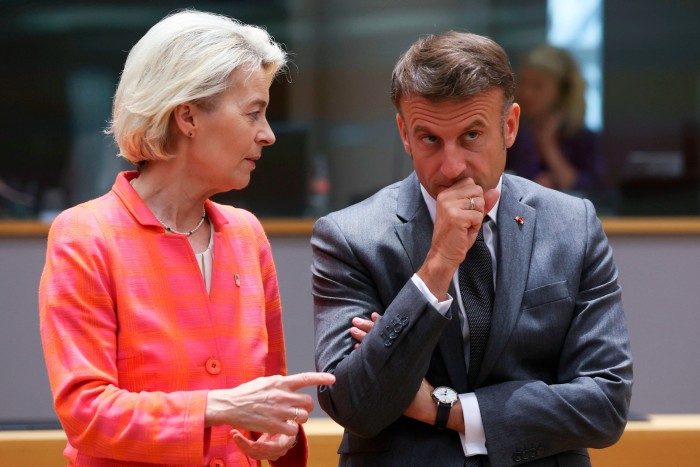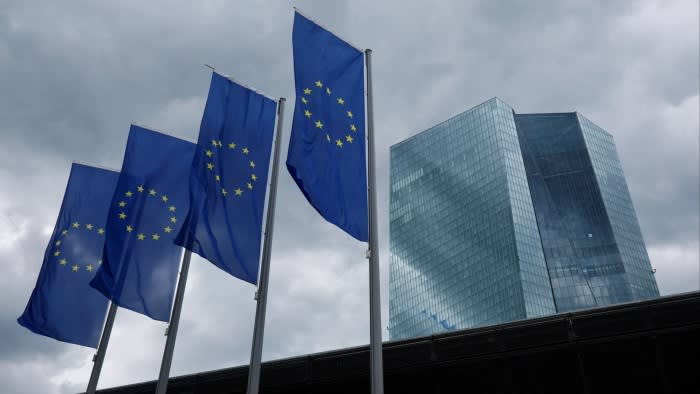The European Central Bank is facing mounting speculation that it could intervene if French elections trigger widespread market panic, as policymakers prepare for their annual conference in Portugal next week.
French bonds have been sold in recent weeks as investors fear that Marine Le Pen’s far-right Rassemblement National or the left-wing alliance Nouveau Front Popculaire (New People’s Front) will win a parliamentary majority in the coming elections.
The success of one of the extreme parties leading the polls could lead to a bigger sell-off, with the spread on the French government’s borrowing costs versus Germany’s — a key measure of political risk — already at its highest levels since the debt crisis in the eurozone more than ten years ago.
German Finance Minister Christian Lindner this week called on the ECB to remain aloof. He warned that if the ECB intervenes to ease the financial turmoil following the French vote, it will “raise some economic and constitutional questions.”
But market watchers are checking the fine print of the ECB’s latest bond-buying program to see what it could do if the next French government embarks on a spending spree that sets off damaging clashes with the EU and financial markets over rising debt.
In particular, investors fear that a broader sell-off of French government debt could trigger a contagion in other European countries, causing national interest rates to diverge.
“If the risk of fragmentation in France were to increase to alarming levels, the ECB would intervene if necessary and preserve the integrity of the euro,” said Sabrina Khanniche, senior economist at Pictet Asset Management.
Fabio Panetta, the head of Italy’s central bank, said this week that the ECB “must be prepared to face the consequences” of shocks caused by “an increase in political uncertainty within countries”.
The Italian also sits on the ECB’s governing council and added that the bank must be prepared to use its “full range of instruments”.
When the ECB announced the “transmission protection instrument” two years ago – giving itself the power to bail out a country in crisis by buying up unlimited amounts of debt – most policymakers hoped it would keep markets in check without ever having to be used.
The French elections threaten to provide the first test for the TPI, which aimed to “counter the unjustified, disorderly market dynamics” that threaten the eurozone’s monetary policy.
However, economists disagree on whether the design of the ECB’s still untested asset purchase programme would prevent the ECB from buying French bonds.
The central bank has set four criteria for activating the TPI and the first says that a country “must comply with the EU fiscal framework”.

However, the European Commission announced earlier this month that it would open an “excessive deficit procedure” against Paris over a budget deficit of 5.5 percent of gross domestic product, well above the 3 percent limit under EU rules.
Some assume this means France is already out of the picture. “It would be illegal for the ECB to use the TPI in the case of France,” wrote Eric Dor, professor of economics at the IESEG School of Management in Paris, on social media site X.
Still, ECB officials privately believe they have enough wiggle room to use the new plan even if a country like France is officially assessed as breaking EU fiscal rules. The central bank also said the four criteria would only be “an input” into a decision by the board of governors.
The key benchmark in determining whether to activate the TPI will likely be whether the market reaction is deemed ‘disorderly’.
ECB chief economist Philip Lane recently hinted at this when he downplayed the sell-off in French markets that followed the election announcement as investors were “reassessing their fundamentals”, contrasting this with what he called “a disorderly market dynamics”.
If the next French government’s policies spook investors and trigger a sharp but orderly repricing of French assets, the ECB is unlikely to act, especially as officials hope that market discipline will encourage countries to respect EU fiscal rules.
But if it triggers a full-blown market panic with investors indiscriminately selling not just French assets but also those of other highly indebted eurozone countries such as Italy, the central bank seems certain to take action.
“I’m sure that’s the question they’re already asking at the ECB,” said Ludovic Subran, chief economist at German insurer Allianz. “If France goes into crisis, that means that Italy is probably going to go into crisis and the ECB has to step in.”
In the past, such shocks have prompted the ECB to intervene. Former chief Mario Draghi made a memorable promise in 2012 to do “whatever it takes” to calm markets after a Greek debt crisis threatened to destroy the euro.
“If Italian spreads were to widen dramatically, the ECB could trigger TPI to prevent a crisis from spreading to innocent bystanders,” said Christian Kopf, head of fixed income at German investor Union Investment Management. “But I have the feeling that we are still a long way from such a market intervention.”
When ECB governors meet on Monday to open their annual showpiece event at a luxury hotel in Sintra, southern Portugal, the results of the first round of France’s parliamentary elections have just been announced.
ECB President Christine Lagarde, herself a former French minister, will no doubt be wondering how the ECB will respond to a potential financial crisis resulting from Paris.
Such questions can be treacherous. Lagarde made a misstep in 2020 when she triggered a bond market sell-off by saying at the start of the pandemic: “We are not here to close spreads.”
The ECB president is likely to be much more cautious this time, especially as the outcome of the elections will not be known until after the second round next weekend.
